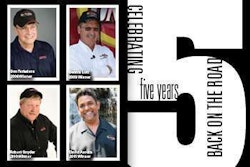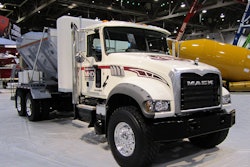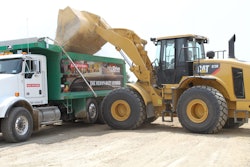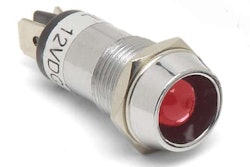As they travel the North American roads, your vehicles are under continuous assault from acids, bird droppings, insect and animal remains, miscellaneous gunk, road salts and other contaminants. In the road war against corrosion, grime and muck, the best strategy to combat the assault is keeping a clean fleet.
Routine standard operating procedure is to maintain a vehicle fleet by keeping tires properly inflated to achieve optimum fuel efficiency and sticking to a regular service schedule for lubrication, parts replacement, hydraulics and a list of other items. A fleet maintenance program that also includes a regular cleaning schedule contributes to extending the life of your investment.
“Keeping your fleet clean is a very important part of a company’s maintenance program – both for longevity of the equipment and brand image,” says Jim Hill, president of JIM Mfg., manufacturer of a mobile brush wash system designed for fleet operation care.
“Regular fleet washing reduces overall vehicle maintenance and keeps the fleet in prime condition,” says Hill. The road grime, salt and dirt build-up contribute to premature wear on dozens of vehicle parts, along with wear on the exterior finish, if not addressed. Washing all that away, however, can reduce or minimize repair costs for fleet operators. As well, a dirty surface has more drag than a clean one, so keeping a trailer clean will save money on fuel for the long haul.
While the impact to the bottom line in reduced repair and fuel expenses is quantifiable, the return on investment is somewhat more intangible, but no less impactful, for a fleet operator’s image. The single most important factor in a first impression is appearance; we often hear this applied to people, but it’s equally true of places and products. A clean vehicle, of course, makes a more positive impression than a dirty one – unless perhaps it’s an SUV in a television advertisement highlighting offroading for the aspirational user.
“A clean fleet directly reflects positively on an operator,” says Hill. “The vehicles represent the company to the public and customers. There’s a reasonable assumption that if a company is committed to this level of maintenance, there’s an equal commitment to overall maintenance. By extension, this contributes to an overall positive impression of the company.”
Hill advises companies operating medium- to large-size fleets on how they can incorporate an efficient and green cleaning function that minimizes cleaning costs for their operations. His company has designed the Vader I 5000 Series mobile cleaning unit which can clean a 53′ trailer in eight minutes or less for only $4, a cost significantly below that of a contract washer or commercial drive-through truck wash.
According to Hill, for a business washing 50 trailers a week, the savings generated by the investment in a mobile cleaning unit from JIM Mfg., Inc., can start within the first year of purchase. The Vader I has undergone a continuous process of upgrading, and many of its features such as “Catch Basin,” “Water Reuse” and “Bay Version” were developed as a direct response to changing industry needs. Formerly made of steel, the water tanks now are made of a polymer that reduces weight and makes it easy to see the water level. Ergonomic redesign of the operator seat and control area provides greater comfort and visibility.
Additionally, since the Vader system is brush-based, it uses fewer chemical cleaning agents than some other washing approaches. Vader also captures and recycles most of the water used in the cleaning process. So together, the Vader approach leaves a smaller environmental footprint.










